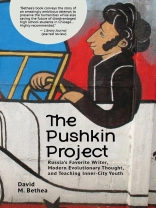“Bethea’s book conveys the story of an amazingly ambitious attempt to preserve the humanities while also saving the future of disadvantaged high school students in Chicago. … Highly recommended.” — Library Journal (starred review)
The Pushkin Project tells the story of how a Russian studies professor changes course late in his career by reeducating himself in evolutionary thought and founding a summer institute that partners with inner-city high schools to implement a new set of learning strategies for underserved youth.These “cognitive cross-training” strategies involve introducing students from Hispanic and Black neighborhoods in the west and south sides of Chicago to the Russian culture and language, with an emphasis on poet, playwright, and novelist Alexander Pushkin. Through the lens of modern evolutionary thought, students adopt not only a new and different language and culture, but also a different sort of literary hero, one whose African heritage within the majority culture speaks to them directly. This inspiring and compelling story provides fascinating insights into Russia’s national poet, brings the sciences and humanities together, and provides new directions in teaching young people from historically disadvantaged backgrounds.
Table of Content
Acknowledgements
Preface
1. Origins
2. PSI: Implementation
3. “The Shot”: Role-Playing with Loaded Pistols
4. “The Stationmaster”: Morality Meets Sexual Selection
5. The Blackamoor of Peter the Great: Identity, Creativity, Homecoming
6. “The Queen of Spades”: Risk, Reward, Gaming Life
Afterword: The Students Respond
Appendix: The PSI Questionnaire
Works Cited
Endnotes
About the author
David M. Bethea is the Vilas Research Professor (emeritus) at the University of Wisconsin-Madison. His books and articles on Russian literature and Russian thought have been recognized by the Guggenheim Foundation, the NEH, the ACLS, and the New York Times. Bethea founded the Pushkin Summer Institute in 2012 and currently serves as its academic director.












